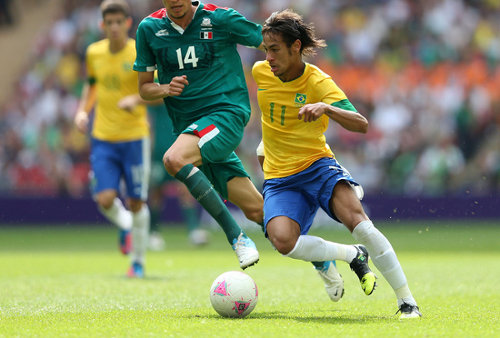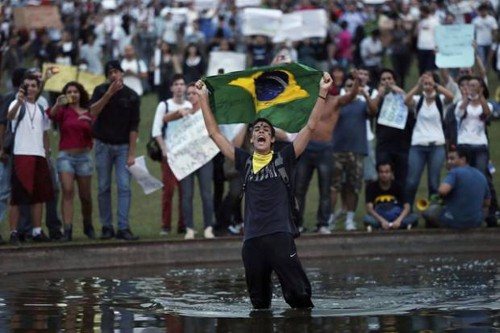Brazil is the only South American country that the Spanish conquistadors of old did not colonise.
And, as football’s new favourites prepare to cross swords with the game’s old favourites, Spain’s football team must know already the scale of the task ahead in tomorrow’s FIFA Confederations Cup final at the Maracanã Stadium in Rio de Janeiro.
Brazil, the most successful team in international football with five World Cup crowns, will not bow easily.

(Courtesy bbc.co.uk)
As the “DIRECTV Road to Brazil 2014” media excursion stopped off at famous Rio football club, Fluminense, for a paid tour of its facilities yesterday, there was a snag. A member of the group was wearing a Venezuelan national team replica jersey; he was refused entry.
Eventually, the Venezuelan sourced a sweater to cover up the offending jersey and the group was allowed entrance. Fluminense’s officials were polite to a fault throughout the evening. But their football headquarters, which faces the famous statue of Jesus Christ, is like holy ground; and thou shalt serve only one god there. Any symbols of other football entities are strictly forbidden.

(Courtesy Wired868)
It is a level of partisanship unknown to Trinidad and Tobago.
In 2001, the Trinidad and Tobago national under-17 team’s Brazilian coach Rene Simoes urged locals to boo opponents at the FIFA Under-17 World Cup and immediately found himself on the receiving end instead for a supposed lack of manners.
Let’s just say that the Spanish senior national team may much prefer to be playing in front of a Trinidad and Tobago audience at the moment. For Spain’s Confederations Cup semi-final against Italy in Fortaleza, coach Vicente del Bosque and his men were jeered upon sight and every time they touched the ball. A week earlier, six Spanish players complained of having money stolen from their hotel rooms in Recife during a group match against Uruguay.
The “Land of the Samba” has absolutely no intention of being colonised by “Tiki Taka.” Good manners, be damned.
Spain never approached its best form against Italy as Brazilians mercilessly whistled and booed every touch. And, despite a gulf in the talents of the two teams on paper, the fierce support of the host nation should not be underestimated.
Now, Andres Iniesta and company must show they can handle the heat at the Maracanã.

Ironically, the Brazil football team might have less support inside the stadium than usual tomorrow.
The Maracanã held roughly 200,000 people at the 1950 World Cup final, which remains a record attendance in the sport. But its 2014 World Cup renovation, which included knocking out thousands of fans to install luxury corporate boxes for 250 guests, has significantly reduced seating capacity to just below 80,000 spectators.
Only 30,000 of those spectators will be football fans. The rest will be guests of FIFA and its commercial sponsors.
Brazil’s taxpayers spent US$500 million on renovating the Maracanã Stadium alone and over US$13 billion on the entire 2014 World Cup. FIFA expects to rake into US$3.5 billion from the tournament and will not give a cent back to Brazil in taxes. Therein lies the crux of the discontent for the World Cup protesters.
Brazilian president Dilma Rousseff twice addressed the nation and appealed for calm last week but it is unlikely to be enough.
In the midst of the social upheavals, Brazil coach Luis “Big Phil” Scolari has the colossal task of trying to undo the most dynamic team in world football today.

Gifted 21-year-old attacker Neymar represents Brazil’s best chance of unhinging a ruthless Spanish defence, marshalled by Real Madrid’s Sergio Ramos, which has not conceded a single goal from open play in this tournament and let in only one Luis Suarez free kick after four matches. Fred, who is the present Fluminense captain, has scored three goals in Brazil’s last two matches and should offer another focal point for the Brazilian attack.
The Spanish offence will be spearheaded by maestro, Iniesta, with able support from Xavi, David Silva.
Tomorrow’s result could yet have untold repercussions on Brazil’s short team future; on and off the pitch. There are already plans to force a national strike on Monday that could frustrate tourists who hope to leave immediately after the Confederations Cup as well as further embarrass the Brazilian president. And sources revealed that demonstrations are scheduled in the build-up to the final too.
Wired868, jointly with the Trinidad Express, should visit the Rio de Janeiro protests and speak to its organisers tomorrow.
Sure, the Maracanã Stadium itself would be fortified by Brazil’s armed forces. But players and supporters are likely to see or experience the anger of the Brazilian people on the way to the match.

(Courtesy globeandmail)
Could that potentially hostile atmosphere have an effect on the Confederations Cup final? Will the fact that more than half of the spectators at the Maracanã are corporate guests dilute Brazil’s home advantage?
Might an especially intimidating reception for FIFA president Sepp Blatter force the global body into a last ditch rethink about its next host nation? Will FIFA gamble that Brazilian tempers would subside drastically in time for next year’s World Cup finals?
There might be more riding on tomorrow’s final and the events surrounding it than at any time in the history of the Confederation Cup.
The football world and Brazil is holding its breath.

Lasana Liburd is the managing director and chief editor at Wired868.com and a journalist with over 20 years experience at several Trinidad and Tobago and international publications including Play the Game, World Soccer, UK Guardian and the Trinidad Express.
 Wired868 Wired868 for smart sport news and opinion
Wired868 Wired868 for smart sport news and opinion






